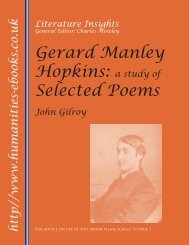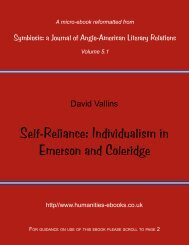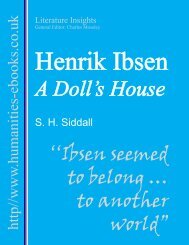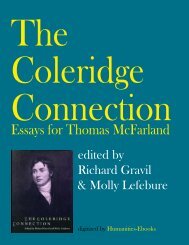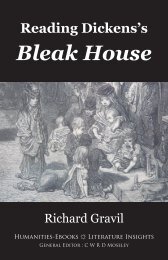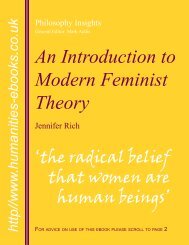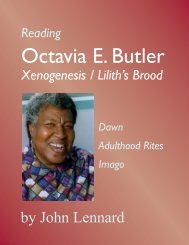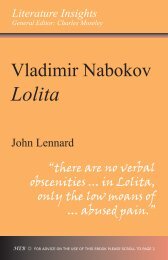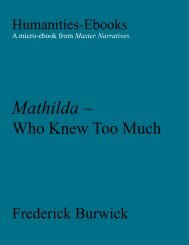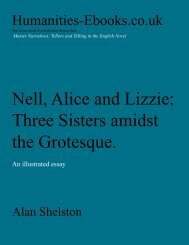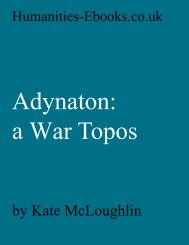Oliver Cromwell - Humanities-Ebooks
Oliver Cromwell - Humanities-Ebooks
Oliver Cromwell - Humanities-Ebooks
Create successful ePaper yourself
Turn your PDF publications into a flip-book with our unique Google optimized e-Paper software.
Running Head <br />
http//www.humanities-ebooks.co.uk<br />
History Insights<br />
General Editor: Martyn Housden<br />
<strong>Oliver</strong><br />
<strong>Cromwell</strong><br />
Graham Goodlad<br />
‘... Old Noll, Copper-face,<br />
Great Leviathan of Men,<br />
His Noseship,<br />
The Sagest of Usurpers,<br />
The Town Bull of Ely ...’<br />
For advice on use of this ebook please scroll to page 2
Publication Data<br />
© Graham Goodlad, 2007<br />
The Author has asserted his right to be identified as the author of this Work<br />
in accordance with the Copyright, Designs and Patents Act 1988.<br />
Published by <strong>Humanities</strong>-<strong>Ebooks</strong>.co.uk<br />
Tirril Hall, Tirril, Penrith CA10 2JE<br />
Reading Options<br />
* Before you proceed please set this book to ‘View: Fit Page’ or set to<br />
82% so that you can progress from page to page using the double arrow<br />
in both toolbars.<br />
* To navigate through the contents use the hyperlinked ‘Bookmarks’ at<br />
the left of the screen.<br />
* To search, click the magnifying glass symbol and select ‘show all results’.<br />
* For ease of reading, use to enlarge the page to full screen,<br />
and return to normal view using the same command.<br />
* Hyperlinks (if any) appear in Blue Underlined Text.<br />
Licence and permissions<br />
This book is licensed for a particular computer or computers. The file itself<br />
may be copied, but the copy will not open until the new user obtains a licence<br />
from the <strong>Humanities</strong>-<strong>Ebooks</strong> website in the usual manner. The original purchaser<br />
may license the same work for a second computer by applying to<br />
support@humanities-ebooks.co.uk with proof of purchase. Permissions: it<br />
is permissible to print a watermarked copy of the book for your own use (you<br />
should do this as a single operation, taking care to select ‘fit to page’ if offered<br />
this option), but not to copy and paste text.<br />
ISBN 978-1-84760-052-3
<strong>Oliver</strong> <strong>Cromwell</strong><br />
Graham Goodlad<br />
History Insights. Tirril: <strong>Humanities</strong>-<strong>Ebooks</strong>, 2007
Contents<br />
Note on the author<br />
Part 1: <strong>Oliver</strong> <strong>Cromwell</strong>: Career Outline<br />
Chapter 1 From country gentleman to political general, 1599–1646<br />
Chapter 2 From regicide to Lord Protector, 1646–58<br />
Part 2: Issues and debates<br />
Chapter 3<br />
Chapter 4<br />
Chapter 5<br />
Chapter 6<br />
<strong>Cromwell</strong> as military commander<br />
Seeking power or seeking the Lord?<br />
The Protectorate at home<br />
<strong>Cromwell</strong> and the international scene<br />
Part 3: The Legacy<br />
Chapter 7<br />
<strong>Cromwell</strong>’s reputation in historical perspective<br />
A Chronology of <strong>Oliver</strong> <strong>Cromwell</strong>’s Career<br />
Bibliography
A Note on the Author<br />
Dr Graham Goodlad has taught History for twenty years and has written widely on<br />
modern and early modern British history for A Level students and undergraduates. He<br />
is currently Director of Studies at St John’s College, Southsea.
Part 1 <strong>Oliver</strong> <strong>Cromwell</strong>: Career Outline<br />
Chapter 1 From country gentleman to political general,<br />
1599–1646<br />
1.1 Introduction<br />
Three and a half centuries after his death, <strong>Oliver</strong> <strong>Cromwell</strong> continues to fascinate<br />
both academic historians and the wider public. It was a tribute to his enduring hold<br />
on the popular imagination that he reached tenth place in the BBC poll for the title of<br />
‘Greatest Briton’ in 2002. This came shortly after the four hundredth anniversary of<br />
<strong>Cromwell</strong>’s birth in 1999, which was commemorated by a number of events, including<br />
major exhibitions at the Museum of London and in Cambridge. He has been the<br />
subject of a number of television documentaries and of at least one major feature<br />
film, <strong>Cromwell</strong> (1970), with Richard Harris in the title role. He is one of a handful of<br />
figures from British history to be commemorated by an organisation dedicated to the<br />
study of his career and legacy: the <strong>Cromwell</strong> Association, which can be located at<br />
www.olivercromwell.org. A museum devoted to <strong>Cromwell</strong> is to be found in his East<br />
Anglian birthplace, Huntingdon; and at nearby Ely, the house that he occupied for a<br />
short time in the 1630s is also open to the public.<br />
Why has <strong>Cromwell</strong> attracted this level of attention? It was in the nineteenth century<br />
that he first began to attain heroic stature, especially after the publication of<br />
Thomas Carlyle’s Letters and Speeches of <strong>Oliver</strong> <strong>Cromwell</strong> in 1845. The leading<br />
Victorian scholar, Samuel Rawson Gardiner, described him as ‘the greatest because<br />
the most typical Englishman of all time’. For historians writing today, however, the<br />
era of Gardiner is perhaps almost as remote as that of <strong>Cromwell</strong> himself. This may<br />
make us less inclined to ascribe to him ‘national’ characteristics capable of application<br />
across the centuries. We may reflect instead on the way in which <strong>Cromwell</strong> embod-<br />
<br />
Christopher Hill, God’s Englishman: <strong>Oliver</strong> <strong>Cromwell</strong> and the English Revolution (London: Pelican<br />
Books, 1972), p. 259.
<strong>Oliver</strong> <strong>Cromwell</strong> <br />
ies key features of his own time, a period that retains its importance and fascination<br />
as a genuinely revolutionary age. He is identified with the assertion of parliamentary<br />
power against the traditional authority of the Crown in the 1640s, with the puritan<br />
challenge to the established Church of England, and the attempt to find a viable<br />
political and religious settlement after the upheavals of the Civil Wars. The way in<br />
which <strong>Cromwell</strong>’s success as a military commander propelled him to the forefront of<br />
national politics, ultimately making him the only commoner to become head of state,<br />
also gives his career unique interest.<br />
The paradoxes of <strong>Cromwell</strong>’s career have often been remarked upon. He struggled<br />
against royal despotism yet established an authoritarian regime of his own and<br />
proved no more able to work with representative institutions than the king whom he<br />
displaced. He was a socially conservative figure who played a leading role in the abolition<br />
of the monarchy and the House of Lords. Regarded by many as an advocate of<br />
religious toleration, he has also been reviled as an implacable foe of Catholicism in<br />
Ireland. To many of his contemporaries, <strong>Cromwell</strong>’s political life was a disappointment,<br />
as the radical of the 1640s gave way to the conservative Lord Protector of the<br />
1650s. This book seeks to address the key debates and controversies that surround his<br />
career. Firstly, it traces <strong>Cromwell</strong>’s development from his relatively obscure beginnings,<br />
though the military and political conflicts of the Civil Wars, to eventual leadership<br />
of his country.<br />
1.2 Out of the fenland shadows<br />
The outline facts regarding <strong>Oliver</strong> <strong>Cromwell</strong>’s early life are well known. He was the<br />
eldest surviving son of Robert and Elizabeth <strong>Cromwell</strong> of Huntingdon, and the dates<br />
of his birth and baptism in April 1599 are recorded. He was educated at the local<br />
grammar school, now the site of the <strong>Cromwell</strong> Museum, and attended Sidney Sussex<br />
College, Cambridge, leaving early on the sudden death of his father in June 1617.<br />
<strong>Cromwell</strong> may have studied Law at one of the Inns of Court in London but there is<br />
no proof of this. Detail of his upbringing and education unfortunately is hampered by<br />
a shortage of hard documentary evidence.<br />
Another difficulty is the doubtful provenance of several stories told about<br />
<strong>Cromwell</strong>’s formative years. These are problematic because of the way in which they<br />
so obviously seem to prefigure his later life. Some reflect his opponents’ desire to<br />
portray him in the worst possible light, whilst others reinforce the image of an individual<br />
marked out by providence for leadership. Among these is the tradition that the
<strong>Oliver</strong> <strong>Cromwell</strong> <br />
baby <strong>Oliver</strong> was taken up on to the roof of his grandfather’s house by the family’s<br />
pet monkey. In the same category is the claim that, as a young child, he fought with<br />
the young Prince Charles during a royal visit to the home of <strong>Cromwell</strong>’s uncle—an<br />
apocryphal foreshadowing of more serious conflict in later life.<br />
The nature of <strong>Cromwell</strong>’s social status has been a controversial area for historians.<br />
As Lord Protector he famously recalled that he was ‘by birth a gentleman, living<br />
neither in any considerable height, nor yet in obscurity’. The exact socio-economic<br />
meaning of this statement has been extensively debated. <strong>Cromwell</strong>’s father had served<br />
as a Member of Parliament and a Justice of the Peace. His grandfather and uncle were<br />
substantial property owners in Huntingdonshire as a result of the family’s acquisition<br />
of church property following the dissolution of the monasteries. <strong>Cromwell</strong> himself<br />
was elected MP for Huntingdon in 1628–29. It seems, however, that the family’s local<br />
standing was undergoing a process of relative decline during <strong>Cromwell</strong>’s youth. His<br />
inheritance from his father was of limited value. In 1631 <strong>Cromwell</strong> slipped further<br />
down the social hierarchy when, following a dispute over the remodelling of the borough’s<br />
charter, he left Huntingdon for St Ives where he became a tenant farmer. The<br />
position improved five years later when a legacy from his mother’s brother, Sir Thomas<br />
Steward, enabled him to move to Ely, where his income improved as an administrator<br />
of church lands and tithes. Even this left <strong>Cromwell</strong> on the margins of the gentry and it<br />
is worth recalling that his later nickname, ‘Lord of the Fens’, was intended to suggest<br />
that he had merely achieved prominence in a regional backwater.<br />
We should however beware of seeing <strong>Cromwell</strong>’s rise as the spectacular, unaided<br />
ascent of a man wholly excluded from the dominant elite of his time. J. C. Davis has<br />
emphasised the importance in his life of a series of overlapping networks, based on<br />
family ties and shared values, which he strove to cultivate throughout his career. <br />
Martyn Bennett has described <strong>Cromwell</strong>’s gentry background as providing a ‘cocoon’<br />
which fostered his development, and which was by no means unusual in seventeenth<br />
century society. <strong>Cromwell</strong> certainly made an advantageous connection in 1620 when<br />
he married Elizabeth Bourchier, the daughter of a London fur trader and leather<br />
dresser, who owned land in Essex. His marriage drew him into the circle of Robert<br />
Rich, Earl of Warwick, the patron of Felsted School in Essex, at which <strong>Cromwell</strong>’s<br />
Speech to Parliament, 12 September 1654, quoted in Ivan Roots, ed., Speeches of <strong>Oliver</strong> <strong>Cromwell</strong><br />
(London: Everyman, 1989), p. 42.<br />
The fullest examination of this phase is John Morrill, ‘The making of <strong>Oliver</strong> <strong>Cromwell</strong>’ in John Morrill,<br />
ed., <strong>Oliver</strong> <strong>Cromwell</strong> and the English Revolution (London: Longman, 1990), pp. 19–48.<br />
J. C. Davis, <strong>Oliver</strong> <strong>Cromwell</strong> (London: Arnold, 2001), pp. 78–80<br />
Martyn Bennett, <strong>Oliver</strong> <strong>Cromwell</strong> (London: Routledge, 2006), p. 8
<strong>Oliver</strong> <strong>Cromwell</strong> <br />
own sons were educated. He counted a number of influential connections among his<br />
cousins, including John Hampden and <strong>Oliver</strong> St John, who were to play an important<br />
role in the coming political upheavals. It has been calculated that when <strong>Cromwell</strong><br />
was elected once more to Parliament in 1640, he numbered at least fifteen kinsmen<br />
among his fellow MPs.<br />
1. The emergence of a revolutionary<br />
Central to <strong>Cromwell</strong>’s identity was the development of his religious beliefs. In his<br />
adult life he became closely associated with the puritan movement within English<br />
Protestantism. Puritans rejected what they regarded as surviving ‘popish’ elements in<br />
the practice of the Church of England. Their faith was based not upon attachment to<br />
outward ceremony and ritual but upon a personal faith in God, whose word was to be<br />
found in the Bible. Puritanism promoted a desire for the moral reform of society and,<br />
at a deeper level, gave a conviction of God’s direct intervention in the life of the individual.<br />
It is not clear when <strong>Cromwell</strong> became seriously influenced by these ideas.<br />
It used to be believed that the Huntingdon schoolmaster, Thomas Beard, played an<br />
important part, early in <strong>Cromwell</strong>’s life, in influencing him in this direction. John<br />
Morrill’s work has however cast serious doubt on this notion. He has uncovered evidence<br />
that Beard was ‘a greedy pluralist’, motivated primarily by his own self-interest,<br />
who remained within the Church of England establishment. <br />
It seems more likely that <strong>Cromwell</strong> experienced a kind of religious conversion<br />
in the late 1620s or early 1630s, and that this was associated with a deep personal<br />
crisis, amounting to a nervous breakdown. It is known that Sir Theodore Mayerne, a<br />
noted London physician, treated him for depression during his term as a Member of<br />
Parliament in 1628–29. The exact date of <strong>Cromwell</strong>’s conversion is not clear but it<br />
seems to have been complete by 1638. It is important to understand its significance<br />
for his career. <strong>Cromwell</strong> described himself in a letter to a relative as having ‘lived<br />
in and loved darkness’ before his spiritual experience, and as having been ‘the chief<br />
of sinners’. This exaggerated characterisation of an individual’s unworthiness was<br />
<br />
<br />
<br />
A good short analysis is Patrick Collinson, English Puritanism (London: Historical Association,<br />
1987). See also Christopher Durston and Jacqueline Eales, ed., The Culture of English Puritanism,<br />
1560–1700 (New York: St Martin’s Press, 1996).<br />
John Morrill, ‘The Making of <strong>Oliver</strong> <strong>Cromwell</strong>’, in John Morrill, ed., <strong>Oliver</strong> <strong>Cromwell</strong> and the English<br />
Revolution, pp.27–8<br />
<strong>Cromwell</strong> to Mrs St John, 13 October 1638, quoted in W. C. Abbott, ed., The Writings and Speeches<br />
of <strong>Oliver</strong> <strong>Cromwell</strong>, Volume 1 (Cambridge, Mass: Harvard University Press, 1937), p. 97.



